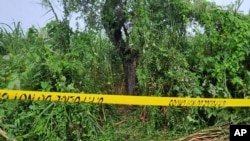The rape, murder and hanging from a tree of two lower caste Hindu Dalit sisters in the north Indian state of Uttar Pradesh has sparked outrage and shock across India.
The bodies of the sisters, 15 and 17, were found hanging from a tree Wednesday evening in the district of Lakhimpur-Kheri. The girls were raped and strangled to death, post-mortem reports confirmed.
According to the police, the girls were in a relationship with two of the six accused men – in early their 20s -- and they left their village voluntarily with some of the accused on their motorcycles. They were taken to a sugarcane field where they were raped before being strangled to death, the police said.
After they were raped "the girls insisted that two of the men marry them," Sanjeev Suman, the police chief of the district, told reporters Thursday.
"The men refused to marry them and they got into a heated argument. Then they strangled the sisters to death," he said.
"After murdering them, the accused men hung their bodies from a tree, using one of their dupattas [stoles], make their deaths appear like suicide."
All the six accused— five Muslim and one Hindu — have been arrested, and two of them confessed to the crime, Suman added.
Although the police said that the girls left their village with the accused willingly, their family alleged that they were kidnapped by the men.
Police handed over the bodies of the girls to their family, who buried them in the village Thursday.
Angry villagers blocked a nearby main road and protested against the rape and killings of the Dalit sisters. The girls' family has demanded about $125,000 and a government job as compensation from the government.
Living at the bottom of a highly discriminatory Hindu hierarchy Dalits routinely face prejudice and violence. In 2020, the gang-rape and murder of a 19-year-old Dalit girl by some high-caste Hindus in Hathras, another district in Uttar Pradesh, sparked massive public outrage.
India's National Crime Record Bureau recently reported that last year saw a 19% increase in rape cases in the country compared to 2020. Agency data also shows a 45% rise in reported rapes of Dalits between 2015 and 2020.
According to several estimates, based on government data, only 1% to 3% of India's rapes are reported, meaning the number of sexual violence cases against women may be many times the government figures. Critics say that despite new anti-rape laws that mandate stricter punishments, sexual crimes against women continue to rise in India.
The government has promised "exemplary" punishment for the perpetrators in the Lakhimpur-Kheri case.
Brajesh Pathak, deputy chief minister of Uttar Pradesh, told reporters, "We will see that the punishments in the case are handed out in a way that the souls of the coming generations of the perpetrators will also shiver."
Many have demanded capital punishment for the culprits in the case on social media, and the girls' father said he wants the "strictest punishment" for the culprits.
"They hanged my daughters. We want all six of them to be hanged, too," he said.




